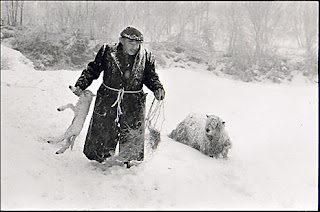A passage from Leaving Alexandria by Richard Holloway that got me thinking and nodding in recognition of that feeling. I just thought I'd share it with you.
' How can you make yourself one with a landscape? You can tramp over it, become so familiar with its contours that you never need a map, but you can never possess it. It is always eluding your desire, just out of reach, beyond your possessing. I did not know the word at the time, or the idea behind it, but on the hills I was experiencing latency, the sense of something hidden behind what is seen. How can you find words for what is beyond sound, make visible what vanishes when seen? .... I was looking for something beyond myself, something out there that would take me out of in here - the life that was going on in my head. I was looking for transcendence, the beyond that is sometimes encountered in the midst of things, usually when we are not looking for it. This is the stab of awareness that causes us to turn on our heels to catch the shadow that is behind us. It is the sense of a presence, beyond knowing, that we reach out towards. And it can be experienced as loneliness. We are missing something, either because it is not there or because we have not yet found it. ' (p.41)




